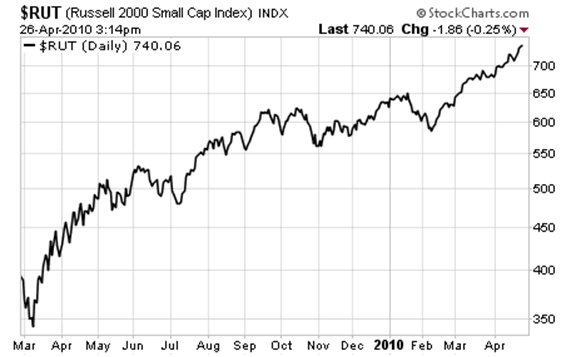The Smallcap Stocks Bubble is Ripe to Burst
Companies / Financial Crash Apr 29, 2010 - 10:01 AM GMTBy: Graham_Summers
I’ve been pounding the table that stocks have entered “bubble-mode” for months now. All the generalized signs are there, including:
- Investor sentiment creeping back to 2007 levels
- The eight week average insider “sell to buy” ratio at late July 2007 levels
- Stocks overextended, overvalued, and overbought
However, finding a distinct metric that PROVES you’re in a bubble is not so easy. Fortunately, Bill King of the King Report has already done it for all of us. Bill’s been actively trading or running trading groups for various Wall Street institutions for over 30 years, so when he has something to say, I listen:
… There is now a bubble in the Russell 2000 and the Small Cap Index. Both indices have more than doubled in the past 13 months – since the end-of-the world lows of March 9, 21009.
The March 9, 2009 Russell 2000 intraday low is 342.57. The Russell 2000 hit 686.95 on March 17, 2010. On Friday it closed at 741.92. No major index has double in 13 months since the Nasdaq doubled from June 1999 to the end of 1999, the only time it did so. It was the greatest stock bubble in US history. The Russell had never doubled within 13 months in its history back to 1978. The DJIA has doubled within 13 months only once. The DJIA doubled from February 1928 to September 1929.
As Bill points out, a market doubling within 13 months is a definite sign of a bubble.
This has only happened once for the Nasdaq (the Tech Bubble) and once for the DJIA (the Pre-1929 Crash rally) in the last 100 years.
It is now happening in the Russell 2000:

As you can see, small cap stocks have recently gone into hyperdrive, shooting up 100+ points since mid-February 2010 alone. At one point I think we even had something like 20 straight up days for the index (similar to the Nasdaq in 1999).
Investing in a bubble is a dangerous exercise. True, you can make some fast gains in the process, but you always need to keep one eye on the exits. If you’re looking to invest in this index, you can buy the Russell 2000 ETF (IWM) or consider some of the Royce Mutual Funds (http://www.roycefunds.com/default.asp). The Royces have been specializing in small cap investing for well over 30 years and are some of the best in the business.
However, be forewarned that smallcaps ARE in a bubble and that ALL bubbles end badly. So if you choose to get some exposure here, make sure you’ve got tight stop losses and an exit strategy in place. Do not simply invest blindly.
Good Investing!
Graham Summers
PS. I’ve put together a FREE Special Report detailing THREE investments that will explode when stocks start to collapse again. I call it Financial Crisis “Round Two” Survival Kit. These investments will not only help to protect your portfolio from the coming carnage, they’ll can also show you enormous profits.
Swing by www.gainspainscapital.com/roundtwo.html to pick up a FREE copy today!
Graham Summers: Graham is Senior Market Strategist at OmniSans Research. He is co-editor of Gain, Pains, and Capital, OmniSans Research’s FREE daily e-letter covering the equity, commodity, currency, and real estate markets.
Graham also writes Private Wealth Advisory, a monthly investment advisory focusing on the most lucrative investment opportunities the financial markets have to offer. Graham understands the big picture from both a macro-economic and capital in/outflow perspective. He translates his understanding into finding trends and undervalued investment opportunities months before the markets catch on: the Private Wealth Advisory portfolio has outperformed the S&P 500 three of the last five years, including a 7% return in 2008 vs. a 37% loss for the S&P 500.
Previously, Graham worked as a Senior Financial Analyst covering global markets for several investment firms in the Mid-Atlantic region. He’s lived and performed research in Europe, Asia, the Middle East, and the United States.
© 2010 Copyright Graham Summers - All Rights Reserved
Disclaimer: The above is a matter of opinion provided for general information purposes only and is not intended as investment advice. Information and analysis above are derived from sources and utilising methods believed to be reliable, but we cannot accept responsibility for any losses you may incur as a result of this analysis. Individuals should consult with their personal financial advisors.
Graham Summers Archive |
© 2005-2022 http://www.MarketOracle.co.uk - The Market Oracle is a FREE Daily Financial Markets Analysis & Forecasting online publication.



